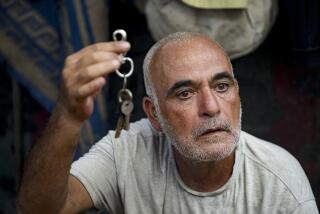200 Couples Refuse to Let Gaza Siege Spoil Their Party
- Share via
JABALIYA REFUGEE CAMP, Gaza Strip — Alaa Abu Jabal swept his arms in an arc, smiling broadly.
“What could be better than this? My friends are here. My family is here. Everybody is here,” he said.
Jabal’s spot high on a bandstand offered a perfect view of more than 5,000 people filling Jabaliya’s Toofah Park on Friday evening.
In between folk songs and national and religious anthems, a master of ceremonies incessantly boomed: “We welcome you all to ‘Weddings From the Heart of the Siege!’ ”
For the 200 couples who participated, the mass wedding reception was equal parts politics and partying.
The name of the celebration made it clear that organizers meant it as an act of political defiance. It was a joyful noise in the face of choking international sanctions on the Hamas-led Palestinian Authority and despite constant Israeli attacks that have ground everyday life to a halt since militant groups seized an Israeli soldier in a cross-border raid June 25.
This morning, airstrikes killed five Palestinians in the southern Gaza town of Rafah. The dead included a mother and two teenage children, said local hospital director Dr. Ali Moussa.
The other two were identified as fighters from Islamic Jihad and from the military wing of Hamas.
Earlier, at Friday’s reception, Yacoub Soliman said, “Despite the incursions, despite the sanctions, despite the raids, we’re still celebrating.”
Soliman is a member of the board of the Islamic Society, a charity that organized the event.
Spectator Youseff Abed Rabo, who had several friends and relatives among the grooms, said, “The Israelis don’t leave us anything. But we still have this.”
The guests on plastic chairs overflowed a park field, with young boys hanging from the trees. A multicolored sea of head scarves to the left marked the section set aside for women and children. Flashes of green, a color that has special significance for Muslims, dotted the crowd -- on baseball caps, scarves and signs.
Closer in, a young Palestinian scout troop marched in front of the stage, along with a pair of dancing horses decked out in embroidered saddle clothes, tassels and bells.
Alongside Jabal, on row after row of green-draped bleachers, sat 199 other young Palestinian men, all residents of Jabaliya or the nearby northern Gaza communities of Beit Lahiya and Beit Hanoun.
The Islamic Society, which is loosely associated with Hamas, put out advertisements for young couples in early summer. The criteria were simple: Couples had to get married between July 1 and Aug. 15, and it had to be the first wedding for both bride and groom.
Such mass celebrations have become fairly common in Gaza. For the participants, it’s a way to avoid the great expense of renting a hotel or banquet hall.
Those costs, along with the price of acquiring and furnishing an apartment, often result in couples staying engaged for years while saving to start their life together.
The participants also get an extra financial boost. The Islamic Society, along with a collection of international Islamic charities, is distributing $100,000 in cash -- $500 per couple. That’s a significant sum in Gaza, where unemployment has reached 40% and most civil servants haven’t been paid in five months.
But first, the couple must present proof that they actually did marry during the six-week window. Organizers left out several couples who had married several months before but wanted the cash, Soliman said.
Many, including Jabal, a 23-year-old who runs a website selling Islamic books, had gotten married in mid-July. Others who haven’t married yet must produce a wedding certificate by Aug. 15 or forfeit their prize.
Given the heavily religious nature of the proceedings, Friday’s event bore several differences from a typical private wedding ceremony.
There was none of the usual hip-wiggling pop music from Lebanese dance divas; instead, traditional folk wedding songs and religious anthems blared over the speakers.
There were also no brides on the bandstand.
Each of the grooms filed into the park hand-in-hand with a young girl, usually a relative. The escorts served as proxy brides, decked out in heavy makeup and white dresses.
When it came time to dance, the girls took center stage and performed their best hip-sways as the grooms clapped in the stands.
“Islam forbids a grown woman to dress like this or dance in public,” said groom Sharhabeel Gharib, 23, whose new wife was watching the celebration amid the crowd. “It’s an Islamic wedding, not like these immoral weddings.... Islam wants us to celebrate of course, but there are limits.”
More to Read
Sign up for Essential California
The most important California stories and recommendations in your inbox every morning.
You may occasionally receive promotional content from the Los Angeles Times.













